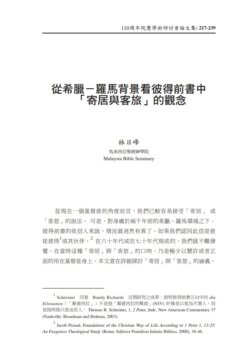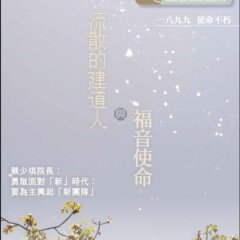從希臘—羅馬背景看彼得前書中「寄居與客旅」的觀念/林日峰
林日峰
撮要
本專文試圖從希羅—羅馬時代的處境來探討彼得前書中「寄居」與「 客旅」之涵義。首先,文章創意性的轉化「寄居」與「 客旅」這在傳統上較負面的詞彙,把它們應用在收信人身上,並給予許多積極的神學與屬靈涵義。這兩個詞彙成為彼得前書主要的啟迪,影響了本書的一致性、文學結構,以及資訊。另外,神的子民為被揀選之「寄居」與 「 客旅」也闡述了他們必須與世俗分別為聖,並且為了信仰的緣故有須忍受苦難。上述詞彙與其他相關的勉勵提升了收信人的視野,並帶來末世之盼望與喜樂。
ABSTRACT
This article attempts to study of the designations “visiting strangers” or “resident aliens” in 1 Peter within the Greco-Roman context. First and foremost, this article suggests that the author of 1 Peter has successfully transformed the (traditional) negative connotations of “visiting strangers” or “resident aliens” into positive designations with spiritual and theological implications when the recipients are addressed as such. These phrases form the catalysts which contribute positively towards 1 Peter’s literary unity, structure and message. The understanding of the people of God as the elect “visiting strangers” or “resident aliens” set them apart from the sinful world, in which they need to endure the pain of suffering in various trials due to their obedience to God to conduct a holy living. These designations and other related admonitions also bring about a higher horizon of eschatological hope and joy.
原載於《教牧期刊》第27期及《建道學刊》第34期合刊(2010年7月),頁217-239。







